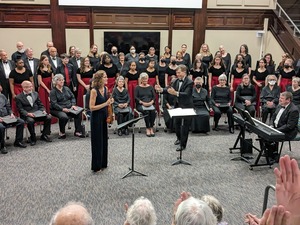The front and back cover of this year’s season program book for the Raleigh Chamber Music Guild (RCMG) features photos of the “usual suspects,” soloists and ensembles in more or less formal attire holding, bowing or blowing their respective instruments – except one. Clad in tank tops, colored shirts, tees and jeans, a line of eight African Americans stare unsmiling at the camera, as if daring anyone to comment on their casual attire within this photo collage of “serious classical musicians.”
They are the Young Eight, an all-African American string octet whose dual purpose is to demonstrate to classical music enthusiasts that there’s life after Mendelssohn and to introduce classical music to kids educated in the musical three “Rs” of rock, reggae and rap. Their brief residency in Raleigh fulfilled both missions.
The Young Eight is made up of violinists Quinton Morris, Chala Yancey, Kayoung Nam and Monica Davis; violists Amber Archibald and Tyrone Tidwell; and cellists Caleb Jones and Tahirah Whittington, all recently minted (with various degrees) from eight of the country’s most prestigious conservatories and/or universities. The musicians met and coalesced at a summer workshop of the NC School of the Arts in 2002 and have been going from one residency to the next ever since. They are also a refreshingly democratic organization, the four violinists trading positions from piece to piece and even between movements. The “biography” in the program features the group as a whole, eschewing personal information about any of the individual players – except to note that violinist Morris is the “director” (whatever that means). The Young Eight are youthful in spirit as well as age, playing with exuberance and obvious enjoyment. Consequently, they came across best when the compositions required such ebullience.
The first half of the program, by living African American composers, was all new to us. George Walker (b.1922) composed his Lyric for Strings, originally for string orchestra, in 1941, dedicating it to his late grandmother (its original title was Lament). It is a gentle work, recalling Samuel Barber’s Adagio for Strings, and the energy of the Young Eight was a bit too much for the subdued music.
They got into their stride with the next work, a world premiere, African Rhapsody for String Octet, by Michael Mikulka (b.1985), which won third place in the 2006 Young Eight Emerging Composers Competition. Composed on a dare in eight hours, it is a series of African modes and rhythms, from the continent’s north all the way to the south, cleverly strung together, occasionally overlaid with the modalities of black America. Here the exuberance of the Young Eight worked well, although intonation suffered in some of the more rapid passages and the tone was a bit rough in the lower register.
The same could be said of the next work on the program, Hip-Hop Experience, arranged by Patrick Grant (b.1964) for about a dozen songs by various Hip-Hop artists and groups, including Salt ‘n’ Peppa, Beyonce, Snoop Dogg, 50 Cent, among others. For many in the audience the experience was probably analogous to that of a teenager sitting through an incomprehensible concert of the North Carolina Symphony. In the absence of program notes, we confess that we had to get a cheat sheet on the artists and source tunes from Morris after the concert.
The second half of the program was dedicated to Felix Mendelssohn’s Octet in E-flat, Op.20. This work of the 16-year-old prodigy requires the youthful ebullience that is the Young Eight’s trademark. While usually performed these days by two discrete string quartets, the Young Eight preserve the original intent of work from the perspective of eight, rather than from four plus four. Despite the fact that the performance suffered in places from fuzzy intonation and a few wrong notes, the overall effect was electrifying.
We hope that as the Young Eight improve and polish their act, they will not lose their enthusiasm and vigor.











